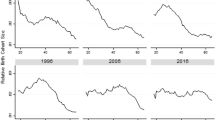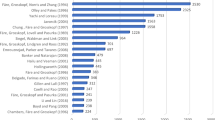Abstract
In this paper we show that it is theoretically impossible to draw empirically founded conclusions about the relation between age and productivity. Only the relation between age and productivityincrease can be verified empirically. With this limitation in mind, a subsequent analysis of productivity data of Dutch physicists, chemists en economists, indicates that thegrowth rate of productivity is higher at ages under 35 than at ages over 35.
Similar content being viewed by others
References
W. DENNIS, Age and productivity among scientists,Science, 123 (1956) 724.
W. DENNIS, Age and achievement: A critique,Journal of Gerontology, 11 (1956) 331.
W. DENNIS, Productivity among American psychologists,American Psychologist, 9 (1964) 191.
W. DENNIS, Creative productivity between the ages of 20 and 80 years,Journal of Gerontology, 21 (1966) 1.
S. COLE, Age and scientific performance,American Journal of Sociology, 84 (1979) 958.
H. C. LEHMAN,Age and achievement, Princeton University Press, 1953.
H. C. LEHMAN, The chemist's most creative years,Science, 127 (1958), 1213.
H. C. LEHMAN, The age decrement in scientific creativity,American Psychologist, 15 (1960) 128.
H. C. LEHMAN, The Psychologist's most creative years,American Psychologist, 21 (1966) 363.
D. C. PELZ, F. M. AANDREWS,Scientists in Organizations; Productive Climate for R&D, New York, Wiley, 1966.
A. E. BAYER, K. W. DUTTON, Career age and research professional activities of academic scientists. Test of alternative nonlinear models and some implications for higher education faculty policies,Journal of Higher Education, No. 3 (May/June 1977), 259.
S. E. FIENBERG, W. M. MASON, Indentification and estimation of age-period-cohort models in the analysis of discrete archival data,Sociological Methodology 1979, pp. 1–67. Jossey-Bass, San Francisco.
L. MELTZER, Scientific productivity in organizational settings,Journal of Social Issues, 12 (1956) 32.
F. M. ANDREWS, Scientific performance related to time spent on technical work, teaching or administration,Administrative Science Quarterly, 10, (1965), 182.
L. R. HARMON, Profiles of the Ph. D's in the sciences: summary report on the follow up of doctorate cohorts 1935–60, National Academy of Sciences/National Research Council, Publ. 1293, Washington, 1965.
R. PRICE, P. H. THOMSON, G. W. DDALTON, A longitudinal study of technological obsolescence,Research Management 18 (6) (1975) 22.
W. J. BROAD, The publishing game: getting more for less,Science, 211 (13 March 1981) 1137.
H. ZUCKERMAN, R. K. MERTON, Age, aging and age structure in science, In:The sociology of science: theoretical and empirical investigations; R. K. MERTON (Ed.), Chicago, University of Chicago Press, 1973.
Author information
Authors and Affiliations
Rights and permissions
About this article
Cite this article
Van Heeringen, A., Dijkwel, P.A. The relationships between age, mobility and scientific productivity. Part II. Scientometrics 11, 281–293 (1987). https://doi.org/10.1007/BF02279350
Received:
Issue Date:
DOI: https://doi.org/10.1007/BF02279350




